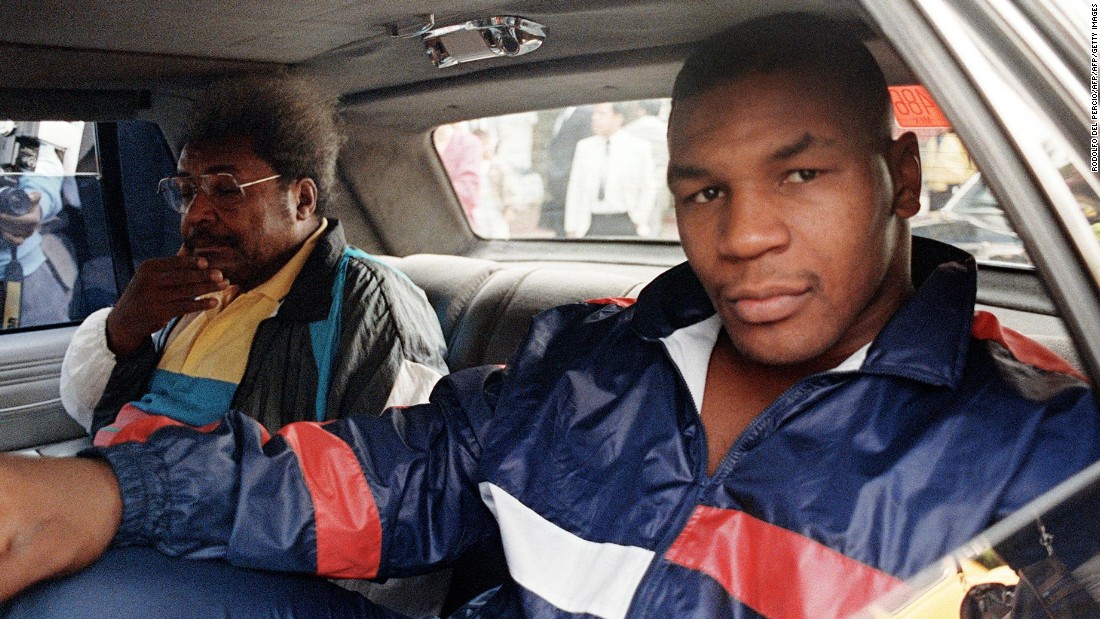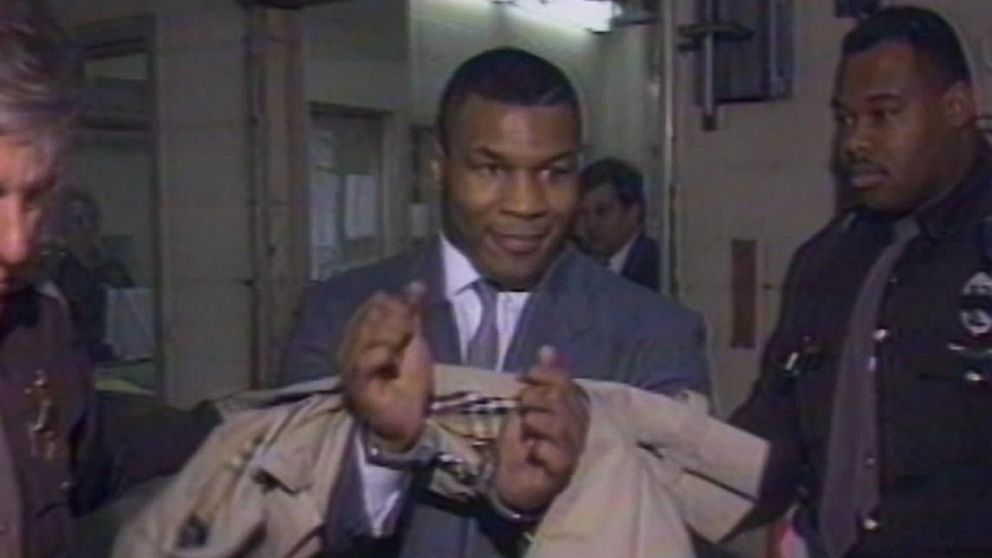Mike Tyson: From Boxing Champ To Controversial Figure & Beyond
Can a single moment in time redefine a legacy? For Mike Tyson, the answer is a resounding yes; the 1992 rape conviction irrevocably altered his trajectory, casting a long shadow over his achievements in the boxing ring.
The echoes of that verdict still resonate today, a stark reminder of the complexities that lie beneath the surface of fame and fortune. It was on February 10, 1992, that an Indianapolis jury delivered a judgment that would forever change the course of Mike Tyson's life. Found guilty of raping Desiree Washington, a Miss Black America contestant, the boxing champion's world was turned upside down. The trial, a media circus from start to finish, captivated the nation, laying bare the raw realities of power, race, and justice in America.
| Full Name | Michael Gerard Tyson |
| Nickname | Iron Mike, Kid Dynamite, The Baddest Man on the Planet |
| Date of Birth | June 30, 1966 |
| Place of Birth | Brooklyn, New York, USA |
| Nationality | American |
| Height | 5 ft 10 in (178 cm) |
| Reach | 71 in (180 cm) |
| Stance | Orthodox |
| Division | Heavyweight |
| Years Active | 19852006, 2020 (exhibition) |
| Trainer | Cus D'Amato, Kevin Rooney, Teddy Atlas |
| Notable Titles | WBC Heavyweight Champion (1986-1990), WBA Heavyweight Champion (1987-1990, 1996), IBF Heavyweight Champion (1987-1990) |
| Record | 50 wins (44 by knockout), 6 losses, 2 no contests |
| Net Worth (Estimated) | $10 Million (as of 2023) |
| Spouse(s) | Robin Givens (m. 1988; div. 1989), Monica Turner (m. 1997; div. 2003), Lakiha Spicer (m. 2009) |
| Children | Several, including Mikey Lorna Tyson, Rayna Tyson, Amir Tyson |
| Legal Issues | Convicted of rape in 1992, served three years in prison |
| Other Ventures | Acting, writing (autobiography "Undisputed Truth"), cannabis business |
| Website | MikeTyson.com |
On March 26, 1992, Judge Patricia Gifford sentenced the former heavyweight champion to six years in prison, a sentence that sent shockwaves through the sports world and beyond. While Tyson would ultimately serve less than three years, his time behind bars marked a turning point in his life, forcing him to confront his demons and grapple with the consequences of his actions.
- Bollywood Buzz Your Guide To New Hindi Movies News
- Taurus Scorpio Friendship Compatibility Challenges More
The legal proceedings were extensive. The trial stretched across 13 days, filled with testimonies from 16 of the pageant contestants, including Washington herself. Tyson, maintaining his innocence, also took the stand in his own defense. However, after nearly 10 hours of deliberation, the jury reached a unanimous verdict: guilty as charged. The atmosphere in the courtroom was thick with tension as the words echoed, sealing Tyson's fate.
In his own account, the boxer expressed his belief that racial undertones permeated the verdict, adding another layer of complexity to an already controversial case. The narrative surrounding the trial was fraught with questions of race, class, and the power dynamics at play between a celebrated athlete and a young woman seeking justice.
Desiree Washington, at the time, was not just a pageant contestant but also a college student, holding the title of Miss Black America. Her testimony painted a stark contrast to the image of the invincible Tyson, revealing a vulnerability that resonated with many. The trial became a battleground for conflicting narratives, each vying for the truth in a case that polarized public opinion.
- Brittany Ashton Holmes Now Life After Little Rascals Revealed
- Mr Miyagis Untold Story The Life Legacy Of Pat Morita
The repercussions of the conviction extended far beyond Tyson's personal life, impacting his career and his public image. His boxing career, once soaring to unprecedented heights after becoming the youngest heavyweight champion in 1986 at the age of 20, faced an abrupt and devastating interruption.
The story of Mike Tyson is one of immense talent intertwined with self-destruction. Born on June 30, 1966, in Brooklyn, New York, his early life was marked by adversity. By the age of 12, he had already been arrested 40 times, a testament to the challenging environment in which he grew up. It was in reform school in upstate New York that his boxing potential was discovered by the legendary trainer Cus D'Amato, who became a father figure and mentor to the young Tyson.
D'Amato's influence transformed Tyson, channeling his raw aggression into a disciplined and formidable force in the ring. Under D'Amato's tutelage, Tyson's career skyrocketed, culminating in his historic heavyweight title win against Trevor Berbick in 1986. He seemed unstoppable, a force of nature with lightning-fast punches and an intimidating presence. But even in those early years, signs of the turmoil that would later consume him were evident.
Following his release from prison in 1995, after serving less than three years of his sentence, Mike Tyson embarked on a series of comeback fights. He regained the WBA and WBC titles in 1996, joining an elite group of boxers who had reclaimed their heavyweight crowns. However, his return was marred by controversy and erratic behavior, further tarnishing his reputation.
The legal troubles that plagued Mike Tyson throughout his career cast a shadow over his accomplishments. The 1992 rape conviction remains the most notorious chapter in his legal saga. After his arrest the previous year, the six-year prison sentence, along with four years of probation, marked a significant downfall for the boxing icon.
Former heavyweight boxing champion Mike Tyson was found guilty late Monday and faced a maximum prison sentence of 60 years, highlighting the severity of the charges against him. The conviction itself became a defining moment, overshadowing his athletic achievements and shaping public perception.
The trial's conclusion, at 10:53 p.m., marked the end of one chapter and the beginning of another. Mike Tyson, now a convicted felon, faced a potential 63 years behind bars. The weight of the verdict was palpable, leaving many to speculate about what might have been if different counsel had been involved.
The question of legal representation loomed large. Some wondered if a different attorney, perhaps Alan Dershowitz, could have altered the outcome. Others questioned the effectiveness of Tyson's initial legal team, suggesting that they might have been out of their element. These questions lingered, adding to the complexity of the case.
Even amidst the controversy, some figures came to Tyson's defense. Three days after the conviction, Donald Trump publicly supported the heavyweight champion, offering a contrasting perspective in a highly charged atmosphere. Trump's defense of Tyson highlighted the divisions surrounding the case and the varying opinions about his guilt or innocence.
Following the Maryland Parole Commission's decision on May 21, 1999, to reduce Tyson's sentence to time served, Judge Gifford announced that Tyson's probation for the 1992 rape conviction had ended. This decision cleared the path for his immediate release from prison, marking the end of a tumultuous chapter in his life. The parole decision was met with mixed reactions, reflecting the ongoing debate about justice and redemption.
The events of February 10, 1992, continue to be scrutinized and debated. On the 25th anniversary of the verdict, insiders recounted the boxer's fight for freedom, a battle that ultimately ended in a unanimous decision against him. The anniversary served as a reminder of the lasting impact of the case and the enduring questions it raised.
Mike Tyson spent nearly three years in prison following his rape conviction, a period that undoubtedly shaped his perspective and outlook on life. Even within the prison walls, Tyson's presence commanded attention. There are accounts of him having to assert his dominance when other prisoners attempted to challenge him, illustrating the constant pressure he faced even in confinement.
Mike Tyson's prison sentence remains a significant chapter in his biography, influencing not only his boxing career but also his public persona and legacy. The conviction and subsequent imprisonment have become inseparable from his identity, prompting ongoing discussions about redemption, forgiveness, and the complexities of celebrity.
In 1992, he was convicted of rape and sentenced to six years in prison, an event that significantly altered the trajectory of his life and career. His release on parole after three years marked the beginning of a long and arduous journey toward rebuilding his life and reputation.
After his release in 1995, he engaged in a series of comeback fights, regaining the WBA and WBC titles in 1996. This achievement placed him among an elite group of boxers, including Floyd Patterson, Muhammad Ali, Tim Witherspoon, Evander Holyfield, and George Foreman, who had also reclaimed their heavyweight championships.
On March 26, 1992, Tyson was sentenced by Judge Gifford to 10 years on each of the three counts, with four years suspended and the sentences to run concurrently, resulting in a total of six years in prison. This sentencing reflected the gravity of the charges and the court's decision to hold Tyson accountable for his actions.
At the time of the trial, Washington was not only a college student but also the reigning Miss Black America, highlighting her role as a public figure and the impact of the case on her personal and professional life. The trial brought her into the spotlight, forcing her to navigate the complexities of the legal system and public scrutiny.
Mike Tyson, a former professional boxer, was convicted of rape and sentenced to six years in prison in 1992, a defining moment that forever changed the course of his life. The conviction served as a stark reminder of the consequences of one's actions and the importance of accountability.
After a long trial, Tyson was found guilty and soon began serving his jail term, a period of reflection and introspection that undoubtedly shaped his future endeavors. His time in prison allowed him to confront his past and consider the path he wanted to take upon his release.
The incident where Mike Tyson attends the Citi Taste of Tennis on August 22, 2019, in New York City, captured by Noam Galai for AYS Sports Marketing/Getty Images, showcases a glimpse of Tyson's life post-prison, as he navigates public appearances and continues to engage with various events. This appearance is just one example of Tyson's ongoing presence in the public eye, even years after the controversies that once defined his career.
- Taurus Scorpio Friendship Compatibility Challenges More
- Mr Miyagis Untold Story The Life Legacy Of Pat Morita

Mike Tyson was convicted of rape. Trump defended him. CNNPolitics

Mike Tyson found guilty of rape, sentenced to six years in prison Part

Mike Tyson is convicted of rape in 1992 New York Daily News